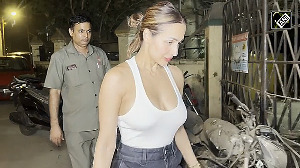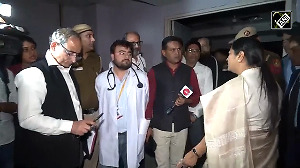Soccer does not need video replays or micro-chips to decide whether goals have been scored, it needs officials with better eyesight and more of them.
Debate over the use of technology has intensified to extraordinary levels following Tottenham Hotspur's "goal that never was" at Old Trafford against Manchester United on Tuesday.
Pedro Mendes "scored" with a last-minute long-range shot after the ball bounced off the chest of United goalkeeper Roy Carroll and carried at least a metre over the United goal-line before Carroll dived back into his net to hook the ball clear.
Instead of signalling a goal, linesman Rob Lewis and referee Mark Clattenburg were unable to see that the ball had crossed the line and play continued.
TV pictures clearly showed the ball in the goal and just about every pundit -- and more than 90 per cent of the public polled -- called for dubious calls to be decided after the fourth official or a new TV official in the stand has watched a video replay of the incident.
OTHER SOLUTIONS
However, there is a faster, cheaper and easier solution, far more in keeping with the game's ethos of the referee having ultimate control of the match.
| |||||||||||
It is simply to have one or two "line judges" or "umpires" positioned behind each goal with special responsibility for penalty area and goal-line incidents.
They would not only be able to assist the referee over whether the ball had crossed the line for a goal kick or goal, they would also see far more clearly whether a player had dived in the area or the ball had been handled in the box.
These officials would be under the referee's jurisdiction in the same way as linesmen have always been. They would be the referee's first option on any dubious penalty area call with the linesman a second option if doubt persisted.
The benefit to the game would be enormous. They would often be far closer to the controversial incident than either the referee or the linesman and they would be able to tell the referee what they had seen in an instant.
Consultations with these new officials would not slow the game down any more than under the present regime. The "Penalty Area Umpire" could make a call on diving, if not offsides which would remain the linesman's responsibility.
VIDEO PROBLEMS
The problem at Old Trafford was created because the officials were, through no real fault of their own, in the wrong position to see the ball had crossed the line.
Lewis, the linesman, sprinted back from his position further upfield towards the goal, with his head down. By the time he had looked up, Carroll had cleared the ball from inside the net.
On this occasion, 30,000 fans at that end of Old Trafford and millions more watching on television knew a goal had been scored.
But what happens when video evidence does not clarify the situation?
What would happen if microchips did not react to the whole of the ball crossing the line because eight players were in the way, or even just the goalkeeper's body?
What does the referee do then? Does he decide in favour of the defending or the attacking team?
And how does the game restart if he decides no goal has been scored? From under the defending team's crossbar, where the incident happened? That would not be fair to them as they have done nothing wrong. Or from the point where the attacker shot?
That would not have been fair to Spurs on Tuesday because they were on the offensive, albeit about 50 metres from goal.
What is certain is that football has resisted real change to the management of a match for far too long.
Even Mark Halsey, the fourth official at Old Trafford on Tuesday who saw the ball cross the line, did not have the authority to alert the referee.
His job is to look after the technical area, supervise substitutions and hold up the board telling fans how much stoppage time has been added.
If the game does not want to introduce modern technology and undermine the referee's authority, it should increase the number of officials under his control.
In tennis, up to 10 officials and an electronic eye keep a watch on the players and the ball.
In the far more complicated game of soccer three men try to control 22 players and keep track of the ball.
What happened at Old Trafford this week proved that the time for change has arrived.








 © 2025
© 2025